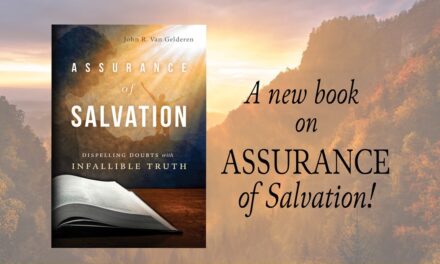In disagreements over that which is not black and white in Scripture, some opt for the slippery slope argument to make their conclusion regarding a given application or standard universal for all. The argument says essentially to not do this, because this could lead to that, and that could lead to the other, and so forth. I have heard this kind of rhetoric for years, especially from those who may be more strict regarding lifestyle issues. But I have come to believe the slippery slope argument is fallacious for several reasons.
First, the slippery slope argument is motivated by fear and motivates with fear. “Well, we know such and such is bad (which may be accurate), so therefore, we should stay away from such and such too, because this could lead to that, and that could lead to the other.” This thinking is based on fear. Also, by the time you get to a position or standard you are usually three or four steps removed from Scripture. While it is legitimate for individuals to be persuaded of a given application for themselves, it is not legitimate to demand their application for all.
The Scripture provides explicit statements of truth, which are clear and should be readily obeyed in faith. But when we add to the Word of God, we move beyond faith to fear. But God has not given us the spirit of fear (1 Tim. 1:7).
In 1 Corinthians 4:6, Paul, in addressing the sectarianism that had cropped up, said, “And these things, brethren, I have in a figure transferred to myself and to Apollos for your sakes; that ye might learn in us not to think of men above that which is written, that no one of you be puffed up for one against another.” We must learn not to go beyond what is written. The commentary by Jamison, Faucet, and Brown says regarding 1 Corinthians 4:6: “Revere the silence of Holy Writ, as much as its declarations: so you will less dogmatize on what is not expressly revealed ( Deu 29:29 ).”
Second, the slippery slope argument creates a zone between truth and error. But I do not see such a zone in Scripture.
Some matters are spelled out clearly in Scripture. These matters are black and white, and therefore, are absolute even if some are less important than others like the “least commandments.” I liken these matters to a plateau of truth. But there are other matters that are not spelled out clearly. These matters may vary within the boundaries of the absolutes, which is the plateau of truth. These matters are often referred to as gray areas. But the term “gray” implies half black and half white. This is misleading and implies areas that are half truth and half error. But a mixture of truth and error would ultimately be error. Gray areas would be better stated as unspecified areas: areas that are not spelled out in the written Word, so we need the Spirit to guide us.
Sometimes these matters are referred to as matters of preference. Yet these matters of preference are really matters of the Holy Spirit’s preference, since He knows what is best for each of us. Since the Holy Spirit ultimately authored the written Word, He will guide in the unspecified areas of application within the boundaries of truth. Here is where we must truly believe in the Holy Spirit. He will lead rightly according the what He knows each individual needs. But this will vary from individual to individual within the boundaries of objective truth.
Truth sets free—always (John 8:32). To argue that something which is not sinful is on a slippery slope is to argue that truth doesn’t always set free, but rather, at times leads you to sin. This is an affront to truth. The Word of truth and the Spirit of truth never lead to sin. If you are on the plateau of the Word and the Spirit, you are not on a slippery slope.
There is truth and there is error, but there is not a third zone in between the two.
Third, the slippery slope argument makes it quite easy for those in leadership positions to control and manipulate. In so doing, it is easy for manmade traditions to eclipse the role of the Holy Spirit. Emperor-styled leaders coerce with their applications made to be a one-size-fits-all, and thus place themselves in the role of the Holy Spirit.
We should all guard against sin and trust in the objective guidance of the written Word and the subjective guidance of the Holy Spirit. But to add a third zone conjured up by man in between truth and error leaves man guiding man, which does not end well.

John Van Gelderen
Post Author












John, I think you’re onto something here. God’s Word (not human logic, or perceptions, or standards) is the final, right answer on all issues.
Trying to find a time to get you back out here.
Thanks Dan, spot on!
Would love to come!
I need to think about this. You are correct that there are two zones, two areas. But is there not also a “boundry zone” that we parents give our children that not only keep them from the dangers to life and limb but also keep them from getting near those dangers? When we were younger, I lived near the railroad tracks. I could get close to the tracks– say where the thing comes down– and be safe. But I might not let my 3 or 5 year old kids that close to the tracks when we are out for a… Read more »
Thank you for your excellent thoughts. In the physical realm, maturity is a factor. So, yes, as parents we will guard in a way that protects until maturity can properly navigate. In the spiritual realm, the Holy Spirit knows individuals well, so He leads each one accordingly. But I do not see this as a slope. Anything on the plateau of truth is strict to someone below. But on the plateau, there is strict and more strict according to the Spirit’s personalized leadership. To disobey the Spirit is the problem, not a given matter if it’s on the plateau of… Read more »
Answering pt. 1… The slippery slope itself is presented in principle in a specific declaration of Scripture in Romans 13:14, “make not provision for the flesh.“ Don’t do something that could make it easier for your flesh to sin. Answering pt. 2… Because the concept of the slippery slope is a declaration of Scripture, to disobey it is not a gray area. So I agree with John that there are no gray areas (except in matters of offense), but the issues that are often attributed to the slippery slope are therefore NOT gray areas! (Edit suggestion: vs. 332?) Answering pt.3…… Read more »
Thanks for your thoughts. Roman’s 13:14 is a great verse, but I believe it is often misunderstood. I addressed this in an article entitled “The Focus of Your Thinking.” I quote from it: “Second, don’t give forethought to ways to indulge your flesh. The word provision means forethought. Don’t think about ways to sin. ‘Make not provision for the flesh’ is not so much about tangible imprudence that makes it easy to sin, but about the intangible thought process and forethought that leads to flesh-indulgence. You can set up tangible standards and guardrails (and you should as the Holy Spirit… Read more »
Thanks for the quick reply, John. I will need to look at your “Focus” article. The Greek word for “provision” is used only 2X in our NT, and one of the two definitions I found is indeed “forethought.” The other is “to make provision for a thing.” Other than Romans 13:14, the other use is Acts 24:2 where the regular Bible translates it “providence.” Opinions may differ, but the context of Romans 13, especially verses 12 and 13 seem to point to the specific actions more than forethought. However, I need to read your other article! <smile>
Thanks Marc. It seems to me that even if we take the meaning “to make provision for a thing,” that in so doing one is entering the temptation. That, of course, is sin.
If the Spirit leads one to a specific guardrail because He knows it’s needed for that individual, then that individual must obey. That’s faith in the Spirit’s specific leading, not fear. But the Spirit may lead someone else to a less strict guardrail if he knows that is all they need. All of this, however, is on the plateau of truth, not a slope.
I can see where you are coming from, but I think even that in itself is applying your standard across the board to everyone. Certain things that perhaps make provision for your flesh, may not be a problem for others; Of course speaking in the context of personal standards, that aren’t laid out in black and white in Scripture.
Braden, do you think that believers who would like to use their liberty as license may tend to see few things as “black and white in Scripture”?
I believe one of the clearest presentations from the Bible of the “slippery slope” principle is the Old Testament laws that seem super strange to someone living today. Many of God’s laws were simply to keep them from going down a path that would lead to sin. God’s wisdom in using this principle is certainly not in question. I know we live in the New Testament era, but God still desires a holy, separated people, and has not changed the way He feels about avoiding the “slippery slope.”
I think what we have is people want to argue about preferences but they really want to live as close to the “world” as a Christian possibly could and they really feel guilty about it and want to do away with their guilt by having as many people agree with them as possible. It is amazing I work in “unsaved” environment and the people I work around expect a Christian to live in a “certain” way BUT it seems the Christians are the ones who want to live differently than what traditional Christians are expected to.
Thank you for your input. The article speaks much about obeying the Holy Spirit. One who has a heart to obey the Holy Spirit is not trying to live close to the world. As the article says at the end, all of us should guard against sin. I’m addressing adding to the Word of God things that are not sin, but treated as if they were.
John:
While truth and error are “black and white” and there can be no mixing of the two, perhaps you could do an article defining what to call “liberty” in 1 Corinthians 8-10 in relation to this article. Some would refer to these chapters as “gray” areas. There is obviously no “gray” in love, and that is the defining theme of those chapters in Corinthians, but the applications differ from one circumstance to another—-so, the applications are not “black and white” if you will. Thank you for your ministry.
Thanks, Steven, I will definitely give this suggestion some thought. There are variables (variations of applications) within the boundaries of the absolutes (black and white), which are not matters of sin.
Fear has been a tormenting work in the church for a long time I am afraid. I remember growing up (around the age of 15) hearing some pastors in the past referring to “grace” as an excuse for the “soft “ to sin. It took me years to get that out of my mind and view God as a loving Father to whom all awe (proper fear) belongs. This kind of fear (generated by man) is actually a tool of Satan. Looking ahead: Any sense of dread or sudden fear is a Satanic spirit. God doesn’t give that to His… Read more »
Thanks Joel! Helpful thoughts regarding fear and grace.
I greatly appreciate the point that the Holy Spirit gave us the commands, principles, and illustrations He deemed best in the words He breathed out. He then declared God’s Word complete and sufficient. To set boundaries for myself is self-discipline, an important discipline for a Christ-believer and follower. To set similar boundaries for my children, based on their maturity, is the training of a loving parent (Hebrews 12:6). I do not have the right or the role to set those boundaries for anyone else. Everyone else in my sphere is either a soul that needs Jesus or a co-heir in… Read more »
Thank you for this heartfelt comment, beautifully stated and well said.
Interesting last paragraph how overreach undermined your confidence to hear from God.
Sadly, those voices are still loud and I still lack confidence. “But I am not ashamed, for I know Whom I have believed, and I am convinced that He is able to guard until that day what has been entrusted to me” (2 Timothy 1:12B ESV).
He is able! As you hear the Living Word and respond in faith, confidence in Him will follow.
Thank you for writing this. It was encouraging. I heard you speak while I was a student at Ambassador as well as received training from you at NBT. Over the years I have come to see that many of the “slippery slope” warnings I’ve heard have not proven to be true. I have met many godly, mature, balanced, zealous believers from all different persuasions/denominations in the greater Church. The common denominator is repentance of sin, truly pursuing Christ, and being faithfully obedient to what it actually written. Having personal “fences” is wise (make no provision for the flesh), but someone… Read more »
Great observations and insightful honesty. Thank you,
There are some important cautions in this slippery slope article, yet we all know that certain things lead to sin. There is a slippery slope and those who are wise will caution the weak to avoid it. This is one reason the Bible warns us not to be close friends with the ungodly (Psalm 1:1; Prov. 4:14; 22:24-25; 1 Cor 15:33). There is no doubt that some people take this concept too far, but the slippery slope is very real. As one example, I have often warned young people or those who have dabbled in alcohol or drugs not to… Read more »
Thank you for sharing. I believe you’re trying to help people. So am I. The article is meant to promote a real relationship with the Holy Spirit and a respect for the written Word. As such, it is addressing the overreach that mistreats people. As I said in a recent article, “Obviously, children need a greater degree of guidance. That is not what I’m addressing. I’m addressing the need for discipleship to lead people to a mature and vibrant relationship with the Spirit of Jesus who gives life to His Word.” If church leaders put standards in place for their… Read more »
I appreciate the clarification about parents having responsibility to guard their children from slippery slope tendencies. Hope I’m not assuming incorrectly, but that would mean you don’t believe the “slippery slope” principle itself is unbiblical. You made the comment, “Whoever will answer to God for a matter should make the decisions about those matters as they are persuaded by the Spirit.” Because a parent has been given the authority in their children’s life, they will be held responsible for how they use that authority in raising them. Hebrews 13:17 says “Obey them that have the rule over you, and submit… Read more »
Thanks so much for these thoughts Don! Wow, you are helping people. This is a very balanced presentation of the “slippery slope” principle. We are living in a world today where many traps have been set by the enemy which will easily ensnare Christians if they are not warned to “perceive the danger and hide themselves.” I’m not sure the greatest danger facing Christians today is that they are being too careful to avoid compromise. With both eyes open, it sure seems like the opposite danger exists.
I appreciate so much the warning of “lording it over the sheep.” Of course that passage is speaking directly to pastors who are viewed as shepherds guiding sheep. During our last furlough, we had the chance to visit many churches, but only four on multiple visits (Cornerstone Baptist in Idaho, Twin Cities Baptist in Nebraska, Marquette Manor Baptist in Illinois, and Falls Baptist in Wisconsin). I was so encouraged by the shepherding ministry of each of these four pastors. Praise God He has given us some humble men of God who love their people and warn them with the most… Read more »
Thanks for your input, Phil. I too have been with many wonderful shepherds who lead their sheep in love rather than lord their sheep in fear. My dad was a wonderful example. I wish every church member had such shepherds.
Question for both of you, how does someone know when a Shepherd is in fact “Lording it over the sheep” and are sheep obligated to submit to a Shepherd if he is in fact doing so?
Leaders influence so people want to follow. Lorders maneuver so people feel like they have to follow. Leaders point people to the Word and the Spirit. Lorders demand man made traditions.